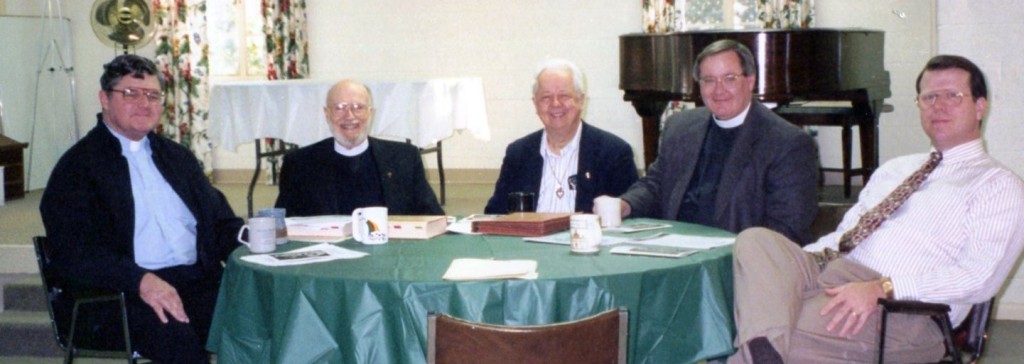I am a life-long Pentecostal, so my criticisms of Pentecostalism are born of Pentecostal zeal. I am not committed to Pentecostal culture; rather I am passionately devoted to the Pentecostal message that God the Father has sent the Son and Spirit to gather humanity in a divine embrace. So, allow me to offer a critique of an element of Pentecostal culture that may lead to Pentecostalism’s irrelevance in coming decades – Pentecostal preaching.
The Pentecostal Bishop
The title of bishop is used to designate a person who is charged with oversight of a local congregation (pastor) and/or multiple congregations. The term “bishop” (episkopos) is used in the New Testament only six times. Five of these occurrences are Pauline and speak to oversight of the church (Acts 20:28; Philippians 1:1; 1 Timothy 3:1ff; and Titus 1:7). The fourth occurrence is Petrine and speaks to the ministry of Christ as he who is “Shepherd and Guardian of your souls” (1 Peter 2:25). In his farewell address to the church elders at Ephesus, the Apostle Paul exhorted, “Be on guard for yourselves and for all the flock, among which the Holy Spirit has made you overseers, to shepherd the church of God which He purchased with His own blood” (Acts 2:28). Here Paul offers a paradigm for understanding the ministry of bishop in the apostolic church.
The Altar of Yahweh Elohim
The name “Elijah” means “Yahweh is my God.” Elijah prophesied in Israel during a time of dark apostasy. During the days of King Omri, many Israelites began to turn away from their ancestral God and turn to the god of the Canaanites, Baal. With the ascension of Ahab to the throne, the apostasy of Israel became complete. Ahab’s wife, Jezebel, was an enthusiastic patron of the Baal cult. Under her direction, the prophets of Yahweh were relentlessly persecuted. The prophets of Baal were welcomed at the royal court. Altars to Baal were constructed throughout the land.
Sacraments: An Ongoing Altar Call
The celebration of the sacraments is an ongoing altar call. For most Pentecostal churches, the altar call is the central event of the worship service. Sinners are encouraged to come forward to the altar to “pray through” to salvation. Believers are encouraged to come to the altar to pray for sanctification, or to “pray through” to the baptism in the Holy Spirit. During the altar service, those who are sick, or otherwise in need, are encouraged to come to the altar. There the church elders will anoint with oil, lay their hands upon the sick, and pray for healing. The celebration of the sacraments in Pentecostal worship should be understood as an opportunity to invite the saints of God once again to the altar to encounter the Holy Spirit in the celebration of water baptism, the Lord’s Supper, foot-washing, and the laying on of hands. Each sacrament directly corresponds to the redemptive work of the Holy Trinity. In this regard, the sacraments are an ongoing altar call in which the believer encounters God through the Holy Spirit.
Why I Love the Church
It has become popular sport to cheer the demise of the church. I guess it’s a part of the DNA of Protestantism to protest, even if it means protesting oneself out of the faith. I remember Bishop John Shelby Spong’s protest in his book Why Christianity must Change or Die. The spirit of Spong can now be read in the works of Brian McClaren, and others. The problem is that this is becoming mainstream. Even among Pentecostals, those over enthused fundamentalist, we hear some of the same. A friend recently shared a post in which someone listed “15 reasons I left the church.” That provoked me to ask myself, “Why do I love the church?” Well, I love the church because…
“But What about the Bible!”
One of the most significant seasons of my spiritual journey was with a small group of pastors in Moultrie, Georgia (circa 1990s) who met weekly to study the gospel text of the common lectionary. The group consisted of an ecumenical mix of two Episcopal priests, one Catholic priest, two Methodist pastors, one Baptist pastor, and me (the Pentecostal). One might wonder how such a group could meet without theological debate, but as we met each week and focused on our gospel study, we discovered we had more about which we agreed than disagreed. In this diversity, each person contributed from his ecclesiastical tradition and was eager to learn about the traditions of others. I have often said that it was in those meetings that I received my theological education.

Pentecostal Sacraments: A Review from Brother Jeffrey Gros
The Pentecostal and liturgical movements are among the most important transformative renewal events of the 20th century. For the most part, their mutual influence has been marginal and minimal, with Pentecostals seeking to restore biblical worship devoid of dead ritualism, and the liturgical movement drawing first on the ancient patristic heritage and more recently on the rich cultural diversity of the Church catholic. This volume will be welcome addition to the emerging literature that seeks to discern the Spirit in both and their mutual enrichment.
The Pentecostal community inherited an “ordinance” approach to the dominical two sacraments in the evangelical Protestant canon, many adding foot washing. This author treats these three, adding anointing and baptism in the Holy Spirit, which those familiar with the sacramental heritage in theology and the liturgical practice of the classical Pentecostal churches will immediately recognize. These are included in this Pentecostal theological treatment, if not yet to the ecumenical canon of sacramental thinking. In the context of foot washing the author treats confession, reconciliation and ministry, all important sacramental rites in the wider ecumenical discussion.
Continue reading “Pentecostal Sacraments: A Review from Brother Jeffrey Gros”
